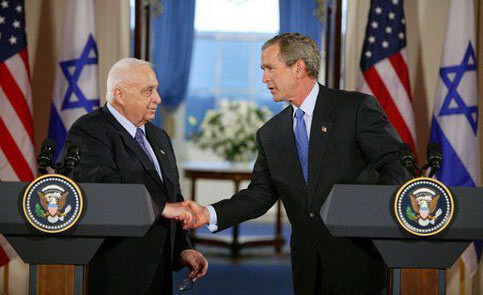17 April 2004

President George W. Bush and Israeli Prime Minister Ariel Sharon during a press conference in the Cross Hall of the White House on April 14, 2004. (White House)
In the past 87 years since Lord Balfour wrote to Lord Rothschild declaring that the United Kingdom favored the establishment of a national home for the Jewish people in Palestine, the world has seen the following:
Israel’s actions are illegal under international law. Now with the 15 April 2004 declaration of George W. Bush, Israel’s seizure of large areas of the West Bank and Gaza and the removal of Palestinian inhabitants have been legitimized, ruling out the establishment of a contiguous Palestinian state in the areas of Palestine that are populated by Arab Palestinians.
1. Balfour Declaration, 2 November 1917

Arthur Balfour
2. Bush Declaration, 15 April 2004

George W. Bush
3. Statement from BADIL: Road map up a cul de sac
It’s a dead end for Palestine and the demise of two-state solution but a “new and better reality for Israel”. The agreement reached between Israel and the United States on unilateral moves to withdraw from Gaza and small areas of the West Bank has been described as “historic and courageous”.
Historic . Yes. It rewards occupation and seizure of land by force. It recognizes illegal Jewish colonies/settlements and puts an end to the idea that a two-state solution could be negotiated with a Zionist Israel. Courageous. No. Two of the world’s major military powers can impose their view of the future on a dispersed and defenseless people. What counts is force not the rule of law.
This agreement preempts future negotiations. Palestinians have not been consulted on the latest moves nor have neighboring states that host several million Palestinian refugees. Do they not have a say in their own future?
It ends the era of “constructive ambiguity” when both Palestinians and Israelis could interpret statements to support their own views and claims. At least it is clear to everyone that what Israel wants, Israel gets.
In 1937, David Ben Gurion, later Israel’s first prime minister, said: “…boundaries of the Zionist aspirations are the concern of the Jewish people and no external factor will be able to limit them”. While this view may always have had support of the United States, it has never been so blatantly proclaimed as on 15 April 2004.
Palestinians in this asymmetrical relationship are again in the position of having to react to unilateral decisions made in Israel and Washington. Such decisions are usually made with Israeli security in mind not security and well-being of Palestinians.
It is the Palestinians who have no negotiating partner. There are no negotiations, only declarations and edicts from one of the parties to the conflict. A durable peace can only be achieved when international law is applied to the Israeli-Palestinian conflict, United Nations resolutions are implemented and Palestinians participate in the development of peace plans.
4. International Law and the Question of Palestine
International law and UN resolutions have been continuously ignored. The following apply to the Palestinian-Israeli conflict:
Humanitarian Law regulates actions during war. The Hague Regulations annexed to the 1907 Hague Convention and the 1949 Geneva Convention provide for the right of return of displaced persons to their homes when hostilities end. Israel recognizes both and is a signatory to the Geneva Convention and conventions mentioned below.
Human Rights Law : The Universal Declaration of Human Rights (UDHR), adopted by the UN in 1948, is the foundation for the right of return in human rights law: ” Everyone has the right to leave any country, including his own, and to return to his country “. The International Covenant on Civil and Political Rights (ICCPR) broadens right of return in Article 12(4): ” No one shall be arbitrarily deprived of the right to enter his own country “.
ICCPR prohibits interference with these rights on the basis of race, color, sex, language, religion, political or other opinion, national/social origin, property, birth or other status. Israel signed/ratified the ICCPR and the International Convention on the Elimination of All Forms of Racial Discrimination that also provides for the “right to leave any country, including one’s one, and to return to one’s country”.
All international laws and conventions apply to Palestinian refugees and the right of return to their homes and properties. The UN affirmed this right for Palestinians in General Assembly Resolution 194, December 1948:
“…refugees wishing to return to their homes and live at peace with their neighbours should be permitted to do so at the earliest practicable date and that compensation should be paid for the property of those choosing not to return and for loss of or damage to property which, under principles of international law or in equity, should be made good by the Government or authorities responsible.”
The same resolution established the UN Conciliation Commission for Palestine (UNCCP) to seek durable solutions for refugees based on a report of Mediator Count Bernadotte. He said Arab refugees had the right to return to their homes in Jewish controlled territory at the earliest possible date. Res.194 requested the UNCCP to facilitate “repatriation, resettlement and economic and social rehabilitation of the refugees and the payment of compensation”.
The Resolution said refugees were entitled to return ” to their homes “, not just their homeland. It also affirms that return be based on the choice of each refugee. Although the General Assembly has reaffirmed the resolution every year since 1948, it has not been implemented. The UNCCP tried to secure the return of refugees and protect their properties but faced with Israel’s persistent refusal to allow return, UNCCP’s mandate was scaled back in the early 1950s so it could neither provide protection nor search for durable solutions.
5. Applicability of international law
BADIL argues that the right of return was considered a customary norm by 1948 , based on existing international law and state practice, especially remedies and obligations enforced at the Nuremberg International Military Tribunal after World War II. Moreover, Israel cannot exempt itself from its obligations under customary law by saying it has persistently objected to the return of refugees as international law does not permit exceptions in the case of norms that may not be violated by any state (i.e. jus cogens norms). While objecting to return, at the same time, Israel is a persistent advocate in areas such as property restitution.
The Zionist/Israeli measures against Palestinian civilians in 1947/48 were codified as jus cogens violations by then (i.e. war crimes, crimes against humanity, genocide; right to self-determination, right of access to basic resources; prohibition against discrimination and acquisition of territory by force). If the forced displacement of Palestinians took place today, it would be considered ethnic cleansing and a crime against humanity. Modern human rights treaties and state practice have established a universal right of return that must be considered customary law.
The UN has adopted more than 200 resolutions on the Palestinian Arab-Israel conflict but the trail of unimplemented resolutions is long, including Israel’s failure to : rescind actions changing the status of Jerusalem; cease building illegal Jewish colonies in the occupied territories; stop deporting Palestinians from the occupied territories; and abide by the 4th Geneva Convention. GA Res. 194 (right of return) has not been enforced nor has SC Res. 242 on withdrawal of Israeli forces from 1967 occupied territories and a just settlement of the refugee problem. Resolutions calling on Israel to comply with its obligations and responsibilities under international law have been vetoed more than 50 times by the US in the Security Council since 1949.
Palestinians are refugees and stateless with no protection of a national authority. Security and human rights protection is particularly problematic in Lebanon, Iraq, Kuwait and other Gulf states, inconsistent in Egypt and Libya and virtually absent in West Bank, eastern Jerusalem and Gaza. Refugees/internally displaced are entitled to protection and assistance under international law but national authorities have the primary responsibility for this within their borders. Significant protection gaps exist due to the collapse of UNCCP activities and limited UNHCR protection. There is no international body with a mandate to protect them or search for durable solutions to the refugee issue.
6. What should be in a peace agreement?
BADIL’s analysis of peace agreements in 13 areas of the world points out that successful agreements include human rights, refugee rights and provision for public participation in formulating and implementing agreements. (See BADIL Bulletins 13-15). In most agreements, the right of refugees/displaced persons to return to their homes and repossess their properties is an important element in finding durable solutions to a conflict.
Refugee rights have been absent from Israeli-Palestinian peacemaking process since it began in Madrid in the early 1990s. Solutions for refugees are framed in “humanitarian terms” without reference to legal norms applied in other refugee cases.
Recognition of refugee rights entails state obligations. Israel does not accept its obligation to grant equal rights to non-Jewish Palestinians. Palestinian right of return poses a challenge to Israel’s definition of itself as a Jewish state. Omitting refugee rights or subordinating them to political considerations, undermines the prospects for durable peace and security. Agreements not recognizing and providing for the voluntary exercise of refugee rights carry the danger of underwriting mass displacement and facilitating its future occurrence.
Related Links